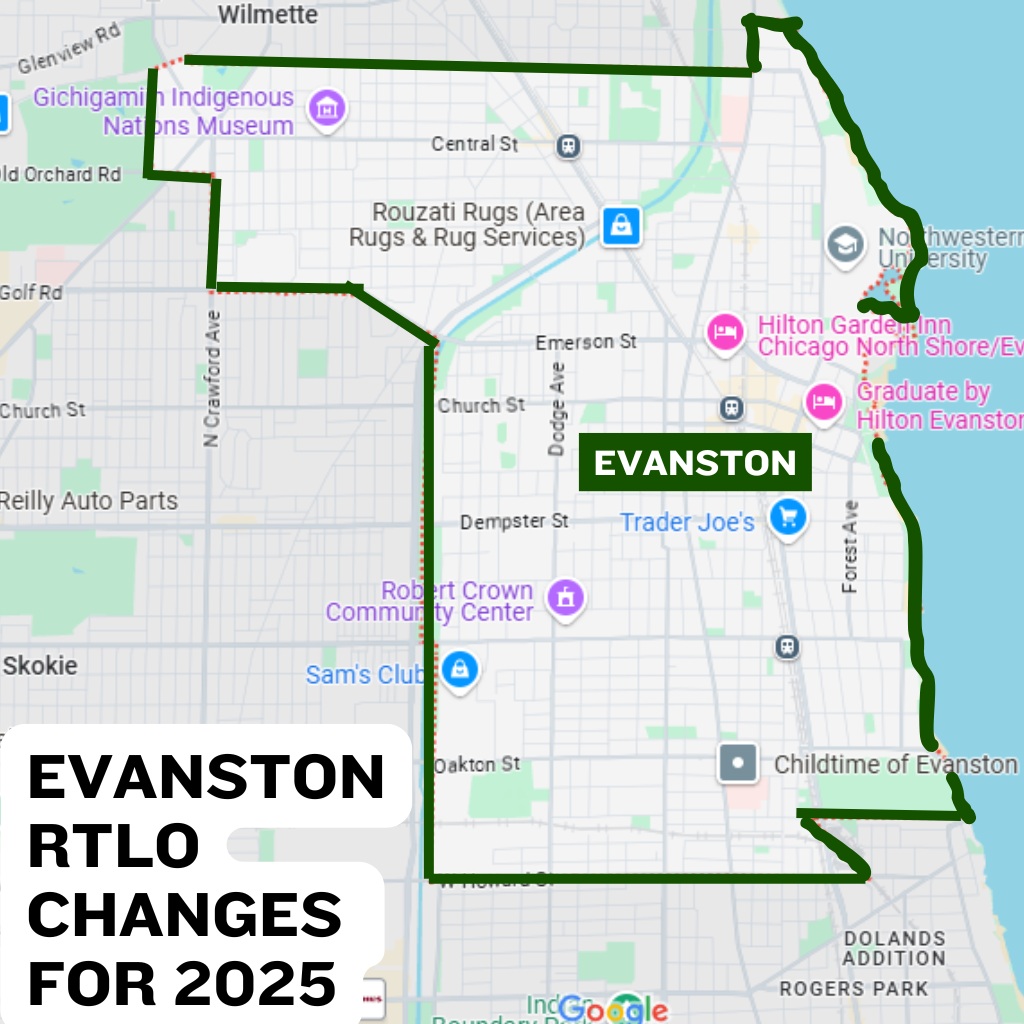
Author: Mark Ainely | Partner GC Realty & Development & Co-Host Straight Up Chicago Investor Podcast
As 2025 approaches, Evanston landlords and property managers must prepare for significant updates to the Evanston Residential Landlord-Tenant Ordinance (RLTO). These changes, aimed at improving tenant protections, have many asking: Do the 2025 updates set landlords up to fail?
If you own or manage rental property in Evanston, read on! We break down the key updates that go into effect on January 1, 2025, and offer compliance tips to help you navigate these changes.

Overview of Evanston’s Updated Ordinance
Evanston's rental laws have changed substantially in recent years, mainly to give tenants stronger protection from predatory landlords. They reflect a broader trend across Illinois and beyond to enhance tenant rights while still allowing landlords to operate their businesses efficiently.
The new laws seek to balance the interests of landlords and tenants to promote transparency, fairness, and accountability in the rental market. Evantson’s new law will substantially impact how landlords and tenants manage single-family homes, multi-unit apartment complexes, or commercial properties in the area.
The changes focus on provisions for late fee caps, non-renewal notice requirements, and tenant organizing rights. They affect tenant interactions, leasing processes, and dispute resolution. To stay compliant, landlords and property managers need to understand these provisions and adjust their policies and practices to meet the new standards in Evanston.
Key Updates to the Evanston RLTO for 2025
The updated ordinance includes several significant changes that every landlord and property manager in Evanston should prepare to follow. Let's break down the key updates:
1. Late Fee Caps
Under the new RLTO provisions, Evanston property managers must adhere to stricter caps on late fees for rent payments. The ordinance sets a maximum late fee that varies slightly from other county and city late fee restrictions. In Evanston, late fees cap at $25 for the first $1,600 and then 5% of anything above $1,600. If the monthly rent is $2,000, late fees could be no more than $45.
It varies by rent and if the tenant's rent is 5, 10, or 15 days late.
This is a critical update for landlords to consider when drafting their lease agreements. If your property management policies currently allow for higher late fees, plan to adjust these accordingly to comply with the new caps. Additionally, property managers will need to ensure that tenants are clearly informed about these caps in their leases.
2. 90-Day Notice for Non-Renewals
Another important change involves the 90-day notice for non-renewals. Under the updated RLTO, Evanston property managers must give tenants 90 days' notice if they intend not to renew a lease or plan to terminate a month-to-month lease. This change gives tenants more stability and time to plan their next steps, but it also affects how property managers handle lease renewals.
3. Tenant Organizing Rights
The ordinance now provides more explicit protections for tenants who wish to organize or form tenant unions. The updated RLTO also expands tenant rights to organize, distribute literature, or use common areas to communicate or hold tenant rights meetings. Landlords cannot retaliate against tenants who engage in organizing activities, such as forming or joining tenant unions or requesting collective bargaining rights.
4. Pay-and-Stay in Evictions
Evanston has made ordinance updates similar to those in Cook County or Chicago that allow tenants to pay and stay. This means that a nonpaying tenant has a one-time right to pay all past due rent to stay in the property before judgment against them. That payment does not include late fees, court costs, or attorney fees. Landlords and property managers are required to accept the payment and dismiss the lawsuit. The good news is tenants can only use this trick once. If they’re late a second time, you can file not to accept payment.
5. Attach Summary Evanston RLTO to Leases
This one seems weird, but please adhere to it. With the 2025 updates, landlords and property managers must attach a summary of the Evanston RLTO to their leases. If they fail to do so, tenants must give the landlord or property manager a two-day notice of failure to attach the RLTO summary. That gives the landlord two days to provide the summary to the tenant or face strict penalties under the ordinance.
Compliance Tips: How to Adapt Policies to New Requirements
These updates to the RLTO require Evanston property managers to adjust their processes and policies. To ensure compliance with the updated regulations, we’ve some practical steps below:
1. Review Lease Agreements
Start by reviewing your current lease agreements to ensure that they reflect the new late fee caps and the 90-day notice for non-renewals. You will need to adjust the language in your leases to specify the maximum late fee allowed under the new ordinance and ensure the non-renewal notice period is extended to 90 days.
2. Update Tenant Communication Protocols
While you should always strive for clear and proactive communication with tenants, make sure you’ve alerted them to these new RLTO updates. Tenants should understand the changes to late fee charges and the 90-day notice for non-renewals well before their lease agreements expire. Be available to answer any questions they have (and get help from experts wherever you’re unsure).
3. Establish Procedures for Tenant Organizing
With the new tenant organizing rights, property managers must not retaliate against tenants involved in unionizing efforts. Ensure that your staff is trained on how to handle situations where tenants express interest in organizing. If you don’t currently have policies for how to interact with tenant organizations, work with experts to develop and get them in writing. Again, make sure your entire staff understands your procedures.
4. Consult with a Property Management Expert
As an Evanston landlord or property manager, if you’re even uncertain about how to implement the new regulations, consult with professionals! Our staff here at GC Realty & Development specializes in Evanston RLTO compliance and can guide you through the complexities of the updated ordinance.
At GC Realty & Development, we understand the complexities of property management in Evanston and the importance of staying compliant with their evolving landlord-tenant laws. Our team knows how to adapt leasing and policies to local rule changes.
If you have specific questions call us at 630-587-7400 or complete our online form today to talk to one of our specialists! We’ll help you stay ahead of the curve and operate in full compliance with Evanston's updated laws.

 Vendor Portal
Vendor Portal
.png)

